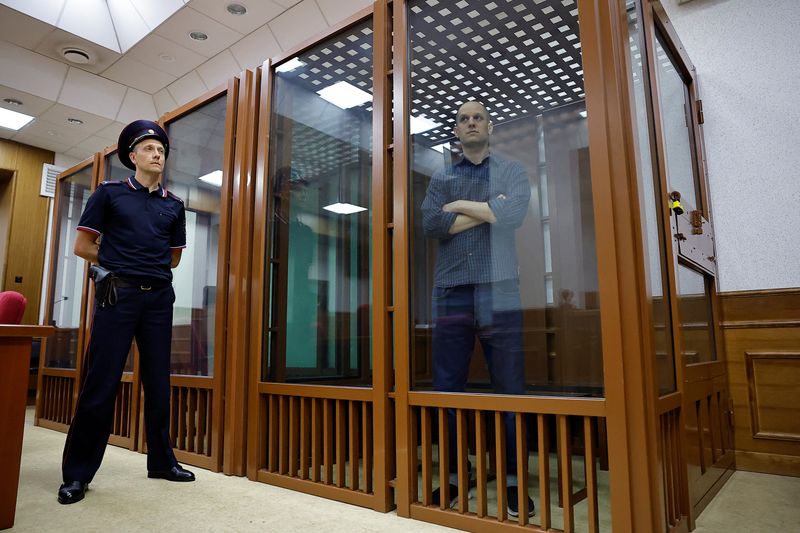[ad_1]
LONDON (Reuters) – U.S. journalist Evan Gershkovich went on trial in Russia on Wednesday on spying charges, which he denies. Here is a short guide to his case.
WHO IS GERSHKOVICH?

Gershkovich is a 32-year-old American who grew up in New Jersey, the son of Soviet parents who emigrated to the United States in 1979. He joined the Wall Street Journal in January 2022 and was among the small number of Western journalists to continue reporting from inside Russia after its full-scale invasion of Ukraine in February of that year.
WHEN WAS HE ARRESTED AND WHY?
The FSB security service arrested him on March 29, 2023, in a steakhouse in the city of Yekaterinburg, where he was on a reporting trip. He was accused of spying, which carries a sentence of up to 20 years. Prosecutors allege he was gathering information on the orders of the U.S. Central Intelligence Agency about Uralvagonzavod, a Russian company that makes tanks for the war in Ukraine. Since his arrest, he has been held for nearly 16 months in Moscow’s Lefortovo prison.
HOW DOES HE PLEAD?
Gershkovich and the Wall Street Journal vehemently protest his innocence. They say he was just doing his job as a reporter accredited by Russia’s Foreign Ministry to work there. The WSJ says the trial is a sham and a guilty verdict is a foregone conclusion.
WHAT DOES THE KREMLIN SAY?
The Kremlin says the case is a legal, not a political, matter but has alleged from the start – without presenting evidence – that Gershkovich was caught „red-handed”. President Vladimir Putin has said Russia is open to a possible prisoner exchange with the United States involving Gershkovich, and that contacts have taken place but must remain secret.
WHAT DOES THE U.S. SAY?
Washington says Russia is using Gershkovich as a bargaining chip and should immediately free him and Paul Whelan, a former U.S. Marine who was convicted in 2020 and is serving a 16-year sentence for spying. It has designated both men as „wrongfully detained”.
WHAT WILL THE TRIAL LOOK LIKE?
The trial is taking place behind closed doors, meaning that the proceedings are secret and the lawyers must sign non-disclosure agreements. No press, family members or U.S. embassy officials are allowed inside, although two U.S. consular staff travelled to Yekaterinburg for the start of the case and had brief access to Gershkovich before it began.
Wednesday’s hearing concluded after several hours and the next one is on Aug. 13, an indication that the case will drag on for a number of months. Evgeniy Smirnov, a lawyer specialising in cases of treason and espionage, said there was no precedent in Putin’s Russia for a defendant in a spy case to be acquitted in court. But if Gershkovich is found guilty, it could clear the way for a deal on a prisoner swap – something that Russia said, very early on in his case, could only happen after a trial had taken place.

WHO IS JUDGING THE CASE?
Judge Andrei Mineyev is the son of a policeman and has spent three decades working in the legal system. He is also presiding over the treason trial that opened this month of Ksenia Karelina, a U.S.-Russian dual national accused of donating funds to the Ukrainian armed forces. In a 2021 interview he said he had only overseen „three or four” acquittals in his career. „The system is organised in such a way that, ideally, cases against innocent and uninvolved persons do not get to court at all. That’s why the percentage is so small. There is nothing wrong with that,” he said.
[ad_2]
Source link

